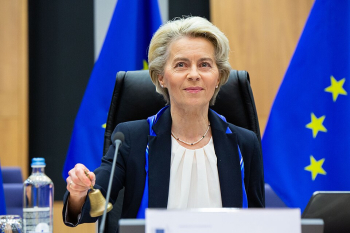
Will it be business as usual or a summer of stalemate?
Ursula von der Leyen learns on Tuesday whether the European Parliament is ready to approve her bid to become the first female president of the European Commission.
defence minister's fate.
If she is to succeed Jean-Claude Juncker in Brussels' top job, she will need an absolute majority of 374 lawmakers voting by secret ballot.
She, of course, has the backing of most of the national leaders who agreed to nominate her at a three-day emergency summit at the start of July.
But she has struggled to win over the parliament's political clans and will be weakened from the outset if she has to rely on eurosceptic support.
"It'll be very difficult for her. It's very complicated to have a reliable political balance," warned analyst Eric Maurice of the Schuman foundation.
The new head of the European Commission is due to take power on November 1, immediately after the latest deadline for Britain's departure from the bloc.
He or she will have to manage the Brexit aftermath, Italy shirking its debt targets and efforts by Poland and Hungary to flout the EU mandated rules of liberal democracy.
For that, the commission president will need a reliable majority in Strasbourg, but May's European election threw up a more fragmented EU parliament than ever.
At the same time, the pan-European political groups that came together after the vote are frustrated by the way von der Leyen's candidacy was foisted on them.
Under the EU Treaty, the head of the commission is nominated by member state leaders, if necessary by a qualified majority vote.
But many in parliament and in the Brussels EU institutions wanted the 28 heads of government to choose one of the parliamentary groups' lead candidates.
- The leaders' choice -
Instead, they cast aside those names and -- after intense closed-door negotiations -- chose to poach Germany's defence minister for the role.
France's President Emmanuel Macron had insisted on the leaders' prerogative to choose, and Germany's Angela Merkel was happy to find a role for an ally.
But this left von der Leyen with a perilously narrow window in which to build ties with a grumpy parliament in a series of aggressive hearings last week.
The biggest single group, her and Merkel's conservative European People's Party (EPP), will back her, despite seeing the candidacy of their leader Manfred Weber cast aside.
But the centre-right's 182 votes do not get her over the line, and the socialist S&D with 154 members and the liberal Renew Europe's 108 are unconvinced.
The Greens, meanwhile, say she will not get their 74 votes, and the hard-left GUE/NGL will also withhold their 41.
The far-right Identity and Democracy, which includes Italy's League, France's National Rally and Germany's AFD, says it is "unlikely" they will back von der Leyen.
Which leaves the right-wing eurosceptic ECR, weakened by the loss of many British Tories but still 62-strong thanks mainly to Poland's PiS governing party.
The ECR has promised to be "pragmatic" and concerned officials admit it might be members hostile to closer EU integration that get von der Leyen over the line.
Juncker began his term with the backing of 422 members of a less fragmented parliament and governed with a comfortable EPP and S&D centrist coalition.
Von der Leyen might scrape in but, as Maurice says, "less than 400 votes would be very weak" -- and a defeat for efforts to build a pro-Europe coalition.
If the German candidate is facing defeat the vote might yet be postponed, but if she is defeated Europe will need to nominate a new champion.
And that could only come after a summer of bitter Brussels infighting.afp

















